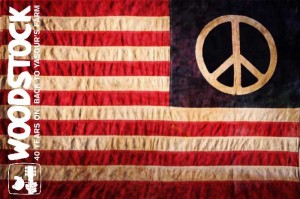Woodstock revisited!
Woodstock: 40 Years On – Back To Yasgur’s Farm
(Rhino)

What better way to spend Lollapalooza weekend than with a six-CD set from a festival nine-years your senior in air-conditioned glory? Take it from someone who wasn’t there!
Short of sending longtime IE scribe David C. Eldredge two hours up the New York State Thruway, we’ve pretty much exhausted 40th-anniversary coverage with reviews of the reissued Woodstock soundtracks and Legacy’s bulked-up full-concert CDs. But when Rhino dropped the 40 Years On set in our laps just before Palooza weekend, we couldn’t resist. What the hell could possibly be worth this much musical tribute?
As it turns out, musical tribute is what this package promotes. “Much has been written about the significance of Woodstock as a cultural event,” the info says. “Ironically, what has been least examined . . . is the music itself.” It might be ironic, but it was also common sense. It’s tough to tell Andy Zax and Brian Kehew their six months spent meticulously plying through three days of tape was in vain, but, if anything, 40 Years blows the roof off the mystique afforded the quote-unquote legendary ’60s performances we always hear about. From the sound of it – corroborated by years of anecdotal evidence – Woodstock was as much a musical disaster as a logistical nightmare: bands stranded at airports, immobilizing drug use, torrential rains, equipment failures, stage-time mix-ups, and Abbie Hoffman. In fact, if any single cut among this box set’s 95 tracks (including announcements) absolutely nails the musical experience of Woodstock, it’s track 72, “The Rainstorm.” For five minutes we’re treated to the dismal situation of being stuck in a field of half-a-million people listening to P.A. addresses while bands wait for the precipitation to dissipate. Ah, the ’60s. Right on!
That’s being harsh, and it would be an error to suggest 40 Years has no value. Contrarily, it’s an unbelievably helpful historical document, which corrects many of the revisions that occurred in the festival’s wake. Principally, Michael Wadleigh’s Oscar-winning documentary used narrative license to distort what was played and when. Many peoples’ post-lysergic memories of the fest were undoubtedly confused and altered by the cinematic presentation, and this set not only debunks the order via the given songs, but reprints the weekend’s setlist in its entirety. (For the record, 40 Years presents 77 soundboard-remastered songs from the festival, half of which have never been released.)
Second, the pair of Woodstock movie soundtracks not only perpetuated Wadleigh’s dubious re-sequencing, but included re-recordings of tracks deemed unsuitable by some artists. (Ravi Shankar re-recorded his entire set afterwards, and still marketed and sold it as if it were captured from the festival.) Thirdly, the accompanying, 76-page insert places old memories back into chronological context, with info about what was originally intended, how the lineup was altered to accommodate traffic problems (Richie Havens was not scheduled to go on first), scuttle those whose demands were too high (Iron Butterfly), and tell you what The Who thought of all this togetherness.
In that spirit, 40 Years is a blood-and-guts look back that unashamedly highlights how ingloriously history actually went down. The folk-centered Friday was cringeingly sincere and anticlimactic. A roller-coaster second day doesn’t do much for the reputations of The Dead, CCR, Janis, or The Who, but, as the liners suggest, you do wonder why more of us didn’t latch onto Canned Heat and Mountain. The third day is a whitewash of the hippie blues you imagine when you see shots of Woodstock attendees shuffling in the grass until Hendrix stuns ’em with his anthem.
If 500,000 people didn’t show up to entertain one another, they might have had a real mess on their hands.
— Steve Forstneger











